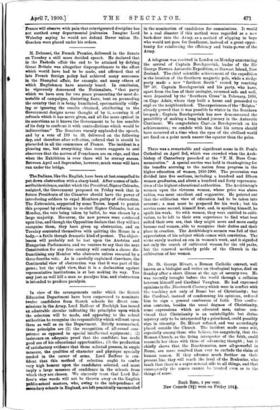There was a remarkable and significant scene in St. Paul's
Cathedral on April 3rd, which was crowded when the Arch- bishop of Canterbury preached at the " F. M. Buss Com- memoration." A special service was held in thanksgiving for the benefits accruing to the nation from progress in the higher education of women, 1850-1900. The procession was divided into five sections, including a hundred and fifteen women graduates, and about a hundred and forty representa- tives of the highest educational authorities. The Archbishop's sermon upon the virtuous woman, whose price was above rubies, was most excellent and suggestive. He pointed out that the utilitarian view of education had to be taken into account ; a man must be prepared for his work ; but his service came second, himself first, and, in spoiling himself, he spoilt his work. So with women, they were entitled to culti. vation, to be left to their own experience to find what best suited their own sex, that they might more and more easily become real women, able to recognise their duties and their place in creation. The Archbishop's sermon was full of that appreciation of his subject which comes with conviction. The scene surely marked an era in women's work, and it signified not only the search of cultivated women for the old paths, but the renewed motherly pride of the Church in the cultivation of her women.






































 Previous page
Previous page